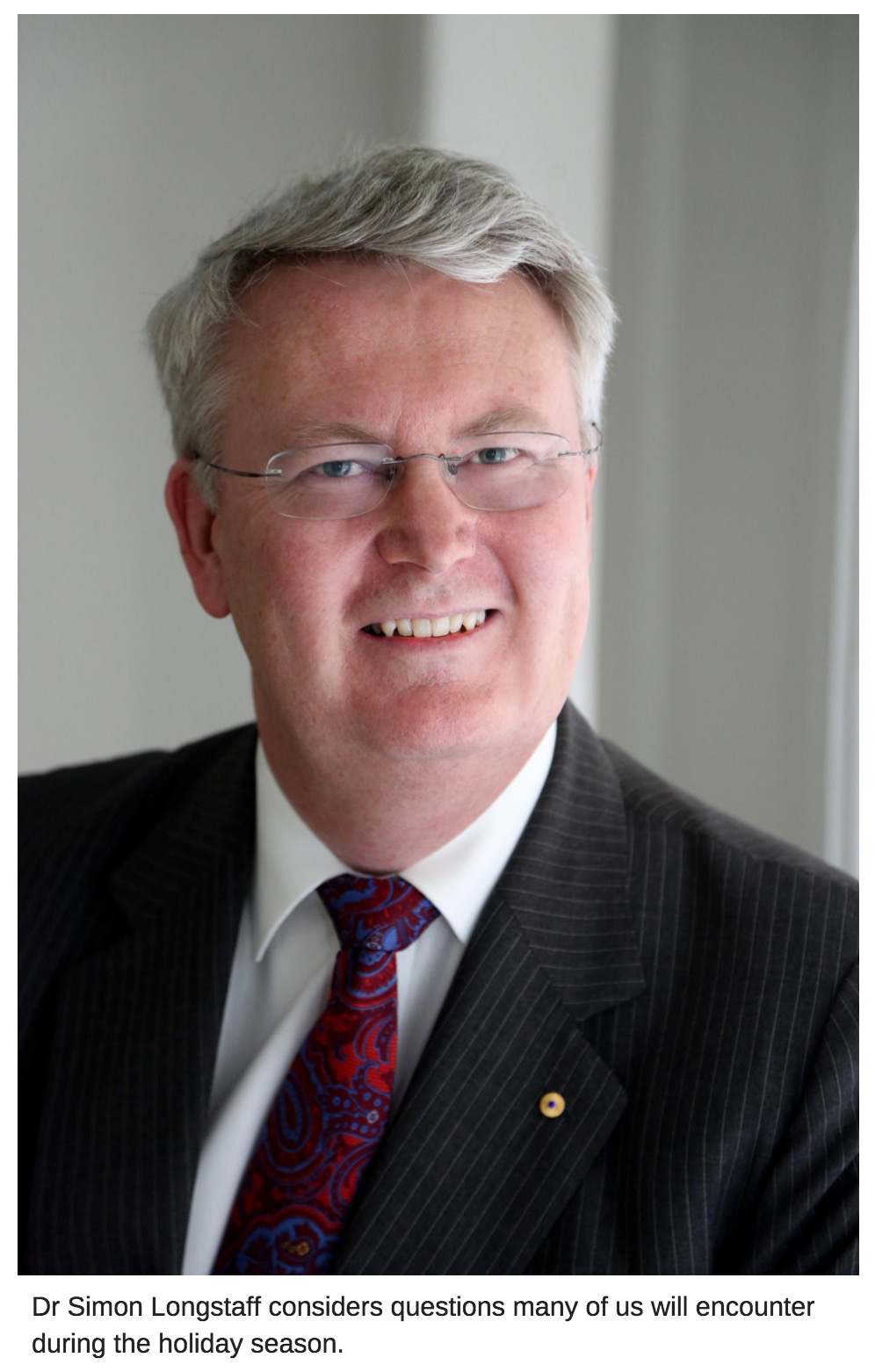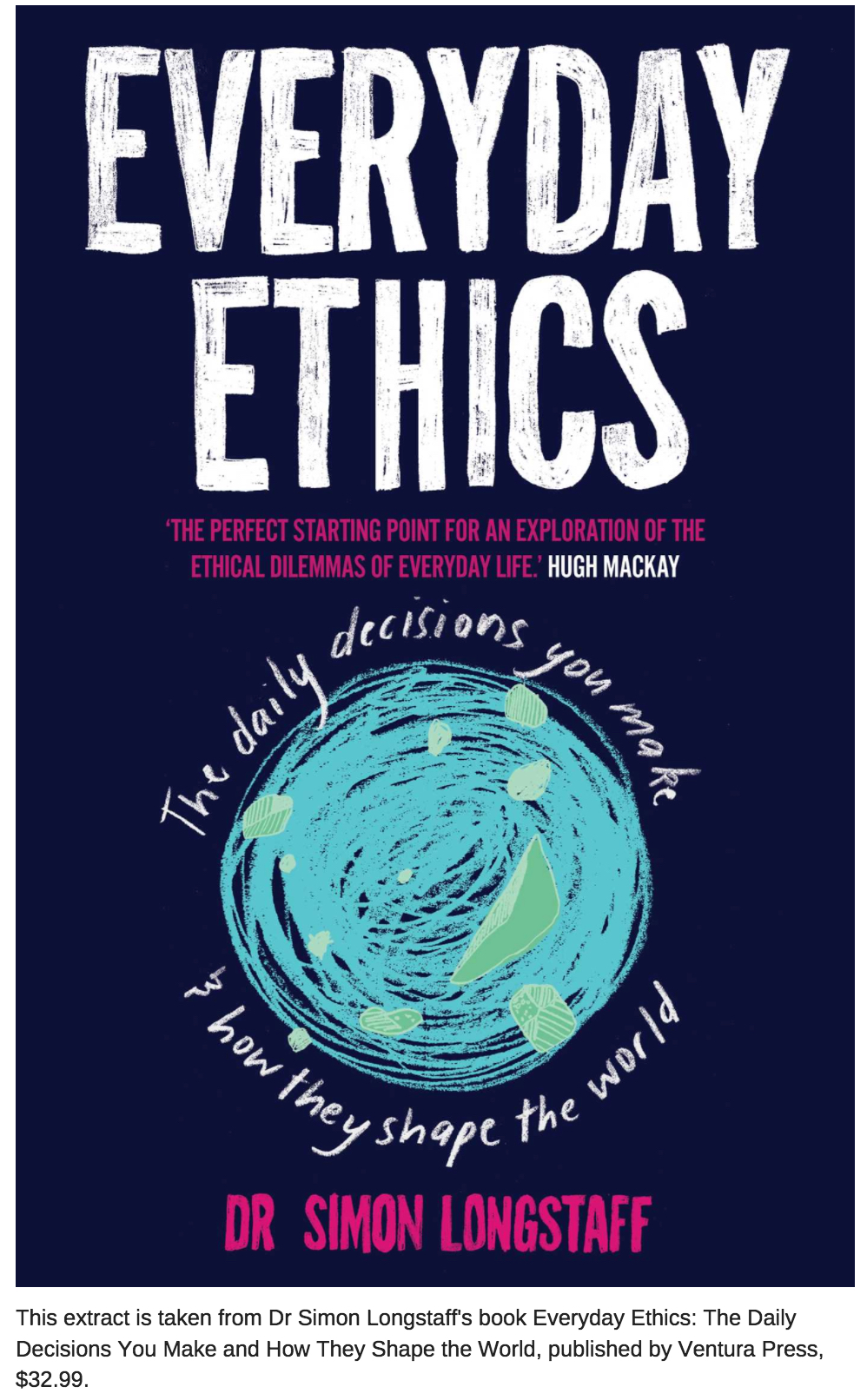
This article is taken from
Our Community Matters.
Get the latest edition here.
The ethics of the holiday season
Dr Simon Longstaff's latest book considers the ethical issues we encounter in our daily lives - from illegal downloading, mobile phone etiquette, Internet dating and dress codes, to weightier things such as abortion, global warming and approaching death.
In this extract from Everyday Ethics: The Daily Decisions You Make and How They Shape the World, Dr Longstaff looks at the notion of the 'examined life' and considers questions many of us will encounter during the holiday season.
For many people the prospect of living an 'examined life' will inspire neither interest nor joy. The idea can sound sanctimonious, an invitation to make life more difficult than it needs to be.
Some who find refuge in religious faith might think it arrogant of humans to think we have the capacity to second-guess god's (or the gods') will. For my part, I cannot accommodate a theology that entertains the idea that a divine being would create a genuinely independent individual endowed with free will only then to have this creature turn off its brain, silence its conscience, and unthinkingly conform to the dictates of a priestly caste or the words written by men in scripture. I know this is a caricature of some theologies, which are usually far more sophisticated for those who penetrate their mysteries, but my account represents the standard experience of religion by the majority of believers.
 I know, too, that every totalitarian - religious, political, cultural, whatever - will be dismayed by a philosopher's appeal to people to think about the life they choose to lead. Totalitarians are the enemy of the best in humanity. They sell us a sense of belonging by scapegoating 'the other'; they quell our opposition by labelling dissent as treason; they assuage our desire for certainty by prescribing what suits their agenda, while proscribing anything original that might emanate from a free mind.
I know, too, that every totalitarian - religious, political, cultural, whatever - will be dismayed by a philosopher's appeal to people to think about the life they choose to lead. Totalitarians are the enemy of the best in humanity. They sell us a sense of belonging by scapegoating 'the other'; they quell our opposition by labelling dissent as treason; they assuage our desire for certainty by prescribing what suits their agenda, while proscribing anything original that might emanate from a free mind.
A few people might think they are too old to take on the challenge of an examined life - too set in their ways. Why bother? Why take on another burden when it is enough to make it through each day? I understand this reluctance, especially when I have painted such a mixed picture of what it means to live such a life.
Yet, if this book demonstrates anything, it is the way in which the ethical dimension intersects with every aspect of our lives and shapes the world we make - together. Humanity's role in climate change is not a mere fact. It is a matter of choice.
The same is true of how we respond to the plight of the most disadvantaged in our immediate communities and abroad. We can look the other way or we can render assistance. It is a matter of choice. The same is true of our relationships - whether it be in connection with the very young or the very old. Along the way, we will encounter people whose lives seem to be in accordance with our personal ideals. Others will confront us with ways of living that, at first glance, seem to be strange and confronting. My counsel is to be slow to judge and aware of any unfounded prejudices that could be clouding your perceptions. This does not imply that you should abandon your values and principles or become a relativist. Instead, it is simply a matter of being genuinely open to the possibility that other ways of living might be instructive - if only to reinforce your own outlook. That, too, is a matter of choice.
For the most part our choices are reflected in the 'things' we make - not just tangible objects but also relationships, institutions and all the rest. Save for the limitations imposed by the laws of physics, these things are and become what we choose. We are therefore responsible for what we make. This is not necessarily in terms of their effect in the world, for this may be in the hands of others. Rather, we are responsible for our intentions in relation to the things we make - in particular, for whether they are fit for purposes that we reasonably believe to be good.
Every new product or organisational design, every new policy or procedure, every new system - all of it should be examined for its ethical status, with adjustments made in the design process. This approach can be applied, without great cost, in both the public and private sectors, as well as in the lives of individuals, families and communities. It is hoped that forethought will lead to more sustainable and just outcomes that serve the interests of all - including the other creatures with whom we exist.
Work colleagues' social behaviour
Occasionally work colleagues can find themselves in a social setting that leads to a revelation of personal characteristics that are surprising or even unnerving. Alcohol need not be involved, but it often is. For example, a person who is quiet and restrained at work might reveal themselves to be larger than life when let loose with a karaoke machine. Of course, the changes can be more startling than that, especially when social and professional inhibitions become relaxed at events such as the office Christmas party.
But you don't need to attend special workplace functions to be affected by the social habits of colleagues. Some people like to hum or sing while working, oblivious to the effect on people nearby; some like to eat pungent foods at their desk, filling the office with odours that others might find unpleasant. Others treat their piece of office space as a private preserve in which mess can run riot. And then there are those keen exercisers who return to the office fitter, hotter and happier but also a bit smellier than their colleagues might enjoy.
 Social and professional inhibitions become relaxed at events such as the office Christmas party.
Social and professional inhibitions become relaxed at events such as the office Christmas party.
For the person concerned, these attributes can be perfectly natural. The garlic eaters and the joggers do not intend to disturb others or cause offence. They are being themselves. Equally, they might object to other types of behaviour - slurping rather than sipping tea, for example.
As in life generally, everyone has to compromise in a workplace. Ideally, the compromise is a matter of choice rather than necessity: it is far better if people anticipate the needs of others and voluntarily adjust their behaviour. This is not possible, however, when people are blind to the effects of their own choices: then it might be necessary to intervene - if not for your own sake, then for the sake of others.
Intervention can be tricky. The person concerned might have no idea that they are a noisy eater, for example, or that they could use some deodorant after exercising, or that their habit of humming the same tune over and over is driving other people nuts. In each of these cases the cause of others' disturbance is a personal attribute, which means that the person concerned might be embarrassed, possibly even offended, to be told that their behaviour is troubling for others. On the other hand, they might be equally embarrassed and upset if they are not told and find out some other way. So, one needs to decide if the disturbance is sufficiently serious to justify intervention. If it is, tact, good humour, sensitivity and an eye for a possible solution are essential.
There is something powerful about coming forward with a problem and then offering a potential solution. A good solution will allow the person to be themselves without having an adverse effect on others. In the examples just mentioned possible solutions could be the provision of a lunch room (with a good exhaust fan), an office shower and bathroom, headphones for staff needing quiet, and a sound baffle next to the hummer's desk.
The questions
How do you create and preserve a harmonious workplace in which people can be themselves without disturbing or otherwise adversely affecting their colleagues?
In particular:
- Are you aware of social boundaries in your workplace? Does your behaviour breach those boundaries by affecting your colleagues' senses?
- Is your colleague unaware of their effect on others?
- Is the source of difficulty an aspect of the individual's person or culture? Is it part of who they are?
- Have you thought about possible solutions to the problem?
- Are there tactful and sensitive measures that can be taken to let the person know there is a problem? Who would be the best person to alert them?
- What is your back-up plan if the person refuses to change their behaviour?
Ethical purchasing
Every purchasing decision we make helps shape a market and, in turn, aspects of the world. We can base our decisions solely on factors such as price, practical utility and status, or we can adopt a broader set of criteria. The reality is that the market is indifferent to our reasons. From a market perspective it is no more rational to choose something because it is red than it is to choose something because it will help reduce global poverty. In that sense the market is amoral and pays no regard to ethics, reason or any notion of intrinsic value.
 Purchasing your presents from ethical sources should be at the top of your list this Christmas.
Purchasing your presents from ethical sources should be at the top of your list this Christmas.
It is up to us to determine what is important. One thing to take into account is the conditions under which people produce the goods and services we consume. For the most part, we are ignorant of this; it usually takes a disaster of some kind or a campaign of exposure by the media or a non-government organisation to come face to face with those who form the supply chain. And the revelations can be shocking - people working in unsanitary places, paid a pittance, working cruelly long hours, with little hope of education or advancement. Stories and images can prick the conscience of consumers, with the result that some products are boycotted and others favoured.
Ethical consumption can be slightly more expensive at the start, and not everybody can afford the additional cost. But the more people favour an ethical market, the greater is its volume of sales and the lower the unit cost of production becomes. In the end, if everybody demands ethically produced goods and services the market will move to an affordable price point.
The trouble is it is not always easy to determine what is ethical in supply chains and production. For example, some producers use child labour in circumstances where the alternatives facing the children are far worse than working in a factory; similarly, some adults work in difficult and dangerous conditions, often separated from family and friends, but they do so because that is their 'least bad' option. The challenge is to distinguish between situations that are genuinely in transition - from bad to better to good - and those that are stuck with bad practices that you might inadvertently be supporting. Care needs to be taken to avoid taking so trenchant a position as to deny opportunities for improvement among those who are making a genuine effort, albeit from a low base. Instead, we should try to structure our purchasing in such a way as to ensure that nothing is obtained from the laggards who make no effort to improve.
Working out who to trust and who to buy from can be difficult because manufacturers and retailers know it is in their interests to appear to be ethical. There are, however, some clues an ethical consumer can be reasonably confident about. The Fairtrade movement and logo can be relied on, along with the marks of other non-profit certifiers who provide assurances that goods and services have been produced in accordance with proper standards for human rights, environmental sustainability, and so on.
Most importantly, look for certifiers that support high levels of transparency - that can show you evidence of progress for people and practices and that claim to be improving conditions, as opposed to having achieved perfection.
The questions
Our purchasing decisions make a difference. The more people support ethical buying the cheaper the products become. But how do we ensure that our good intentions don't end up producing bad outcomes, especially for the most vulnerable in this world?
In particular:
- Do you know about the conditions under which the things you are buying were produced? Can you find out?
- If children are involved in production, are their conditions improving over time? For example, is work combined with education?
- Would children involved in the production of goods or the provision of services - for example, girls sold into prostitution - be worse off if they were not working in these jobs?
- Do you pay attention to reliable guides to ethical procurement, such as the Fairtrade movement?
- Do you tell retailers you want to buy goods and services that have been ethically produced and obtained?
Difficult relatives
Each year I hear stories of people anxiously preparing for family gatherings, often associated with a religious or cultural festival. There is a common pattern to their stories - relatives who are obnoxious, relatives who overstep the mark and try to discipline others' children, relatives spoiling for a fight over an ancient grievance that everyone else has let go but that defines their sense of identity. Alcohol can add fuel to the embers of family resentments and tensions, but even the most sober can self-combust in the hothouse of a family gathering. In some cases, the pressure to consume at a particular time and in a particular way is awful. Just one spark can ignite a fireball that scorches at least a few people who are otherwise enjoying their favourite festive fare. For the most part, though, people with 'difficult' relatives grit their teeth, smile, hug and hope for the best.
 Even the most sober can self-combust in the hothouse of a family gathering.
Even the most sober can self-combust in the hothouse of a family gathering.
Of course, there are also families for whom seeing relatives is a delight and who come together with effortless pleasure. They might be the lucky few because, as the saying goes, we don't get to choose our relatives (or their spouses and children) - only our friends.
So what should we do when a relative behaves odiously? Should we make special allowances for them for the sake of blood or family harmony or should we call them to account?
The questions
Families, however they might be constituted, are an essential institution in all societies. Yet they are often made up of individuals you might never choose to associate with if given a choice. How do we manage difficult relatives while being true to our own values and principles?
In particular:
- Do you and your immediate family derive advantage from being part of your larger, extended family?
- Is your relative's behaviour merely annoying or does it violate your central values and principles?
- Is it possible to manage your relative's behaviour without causing a scene? For example, can the person be placed in the company of a family 'peace maker' who can prevent or limit the potential damage?
- Is your relative even aware of the effect he or she is having on others?
- Is your relative's behaviour harming others who cannot defend themselves?
- Will intervention be futile? Is the person unable or unwilling to change?
- If the person is the spouse of one of your blood relatives, would your blood relative be offended if you called either of them to account?
Unwanted gifts
Occasionally someone gives you a gift that you genuinely do not want. The example I have in mind is when someone's grandmother knits a truly awful jumper that will only cause embarrassment if worn. She presents it with love and pride and asks the recipient to try it on. This is one of those no-win situations that can arise in life. What do you do?
Then there can be business situations when gifts and hospitality exceed what is reasonable. In business, the context is always one of 'mutual self-interest'. Knowing this, how do you respond to offers that are well in excess of normal practice or are potentially compromising? I often hear from people who have been at a business function where the hospitality has included access to sex workers. What if this is outside the bounds of your personal moral code?
Giving and receiving gifts can involve complex behaviours. Refusal of a gift can cause embarrassment and sometimes offence. The giver might be embarrassed at not having accurately gauged your preferences or ethical framework. Offence can also be caused, if your refusal to accept a gift is thought to be a repudiation of the individual or if it causes a loss of face. Yet there could be further personal dishonour if you accept a gift that compromises you or you pretend to like something you actually loathe.
 Giving and receiving gifts can involve complex behaviours. Assess your involvement in the process by answering these important questions.
Giving and receiving gifts can involve complex behaviours. Assess your involvement in the process by answering these important questions.
The questions
Do you understand the cultural context of gift-giving and, in particular, the underlying values and principles that are being expressed in this context? Have you taken account of the symbolic and emotional aspects of what it means to offer, receive or refuse a gift in this context?
In particular:
- Is your moral compass well calibrated? Or do you place your personal preference (or the convenience of avoiding a 'difficult moment') ahead of ethical considerations?
- Would acceptance of the gift compromise your values and principles?
- Does your relationship with the gift giver (a relative, for example) create special obligations?
- Is the relationship strong enough to survive a candid response to the gift? For example, could you tell your grandmother you love her and you love the thought behind her gift while giving reasons why you cannot use it?
- Are the rules of guidelines that let you off the hook, enabling you to say, 'The rules that prevent me from accepting...'?
- Can the gift be accepted but not be used by you - perhaps if you register it as being available for use by others who do not risk being compromised?
Disposing of surplus gadgets
Until quite recently our local council used to collect e-waste (things such as old phones and computers) as part of household rubbish, but now the e-waste is excluded. So our small pile of old gadgets is beginning to grow. At some stage I will take the waste to a collection point, but for now it sits there gathering dust. This is despite the fact that it would be easy to slip the odd obsolete or broken phone into the food waste and send it off to landfill. Nobody would notice one old phone in the vast expanse of waste, and I would be free of a minor irritation.
The questions
Why should we act responsibly when it would be more convenient to pursue the selfish option - with little risk of being exposed?
Given that there is considerable value in an old phone - gold, rare earths, embedded energy, and so on, that could be recycled and put to further use - are we obliged to ensure that these resources are not squandered? One person's waste is another person's opportunity
In particular:
- The earth has finite resources: wouldn't it be better to make do with less?
- Someone will have to pay the price for the lost opportunity or the cost of preventable pollution. What if it is one of your children who ends up paying that price?
- Is the burden of recycling really so hard to shoulder?
- Are there ways to share the responsibility - for example, a community or street collection that you and your neighbours arrange?
Final words
There is nothing heroic about living an examined life. It is more difficult than a life of habit - even 'virtuous habits'. And few will stop you in the street and say, 'Well done. It's great the way you think about things.'  Most people won't even notice. But it is a life fit for a human being - possibly the only life worth living for one of our kind.
Most people won't even notice. But it is a life fit for a human being - possibly the only life worth living for one of our kind.
I finish with a poem I wrote decades ago, when I was setting out on the adventure that has been my life thus far. Perhaps you will think of this when you come to reflect, with a calm spirit and subtle mind, on how you will respond to the questions explored in this book.
HEROISM
Some think that heroes are forged in te white heat of the dangerous moment.
But there is another kind of hero -
The person of quiet decency
Whose achievement is built not only over an entire career.
We are struck by the intensity of lightning,
Yet fail to mention the thunder that rolls into the distance
Long after the lightning's moment has passed.
We are capture by the tumultuous descent of the waterfall
While forgetting the steady progress of the river.
And we marvel at the ocean's power,
Unaware that we stand on the ground
Claimed for us by the silent witness of the ancient cliff.
This article is taken from
Our Community Matters.
Get the latest edition here.
Mr Simon Longstaff is the director of The Ethics Centre. For more information on the organisation, click here.
@SimonLongstaff on Twitter.
